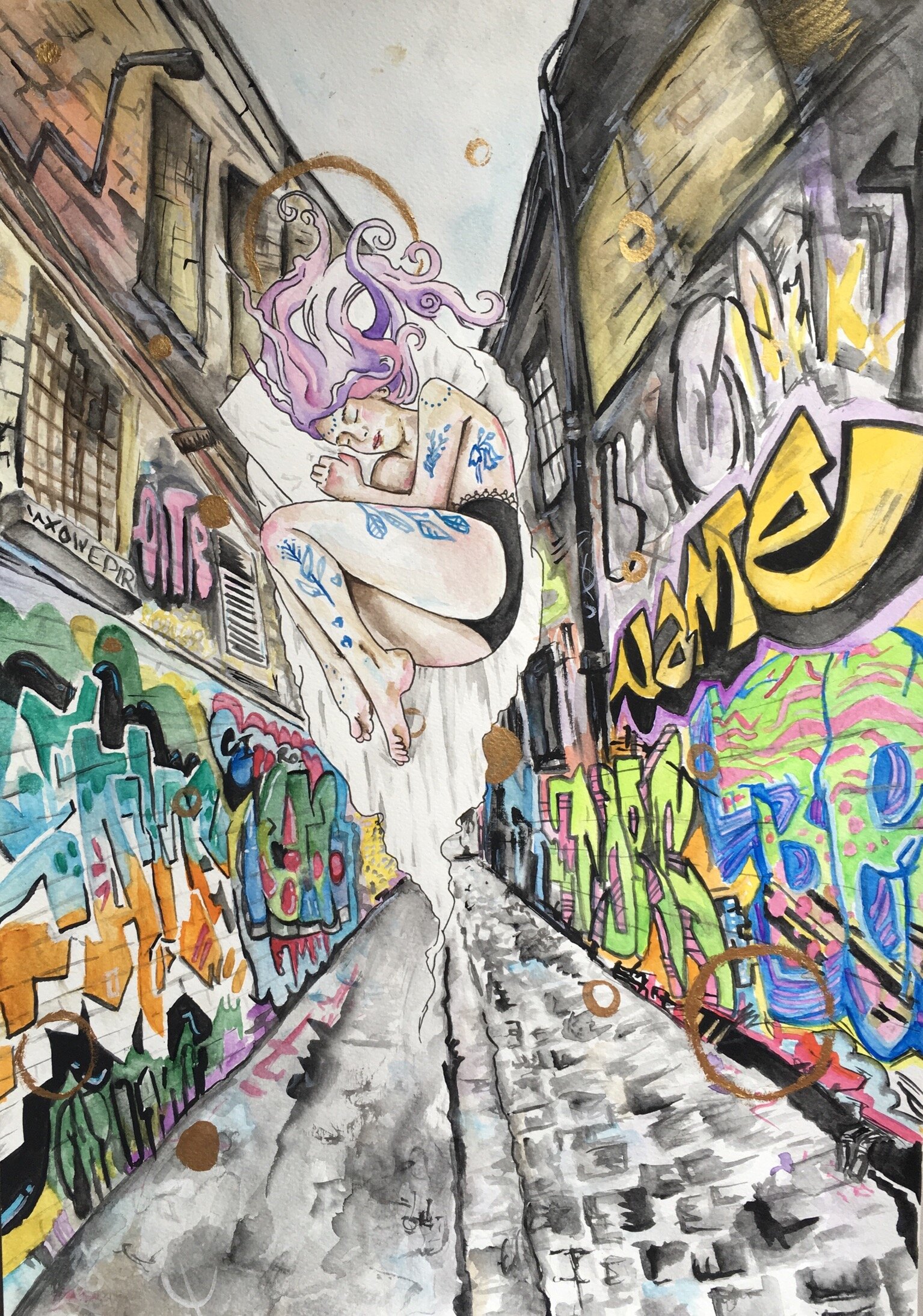The summer I broke my ankle, I began to find the dead birds. I had been told light exercise would be good for me, so I hobbled back and forth along the short stretch of park by my house looking at the ground so I wouldn’t trip. Maybe that was why I noticed the birds, when nobody else seemed to. They were always half obscured under mounds of leaf skeletons, or they had begun to come apart and decompose, all twisted masses of feathers and dried out pink tendons.
That kind of natural decay is pretty easy to look at without paying close attention. Better not to think too much about what it’ll do to you someday. But the broken foot had made me a little more morbidly introspective than usual, so I stopped and studied the dead bird bodies each time I found one. There were several different kinds: pigeons, magpies, sparrows, and more than anything else, crows.
At first, I didn’t notice much out of the ordinary. Those initial birds had already decomposed so much that their bodies were hard to distinguish. But the fourth one was different, a crow that looked as though it must have died recently. It showed no signs of decay, and through the center of its chest, the widest part of the breast near its heart, there was a neat hole the width of two fingers.
I’d figured it had to be a bullet hole or the result of another man-made weapon. Still, it didn’t seem like a wound. There was no blood, and it was so clean, the feathers folding inward around the hole. It almost seemed like a part of the bird, like some strange birth defect, the opposite of a malignant growth. A complete dearth of cells rather than a proliferation of them.
Searching for the birds became the main purpose of my walks. I gave up my physical therapy stretches and would walk until a dull, prickling pain began rising up my injured ankle. The park and its surrounding neighborhoods began to seem cavernous and I felt as if they might spill their guts to me, reveal everything, if I kept walking past the safety of the afternoons into the near dark.
I’ve always thought this might be a problem with me; whenever I get too isolated, I start to think of life as this labyrinth where the most complex solution somehow makes the most sense. A friend told me that maybe it’s because social situations require a certain simplifying. To relate to other people, you have to ignore a lot of the more complex readings of what’s going on. People relate intuitively, through a set of agreed upon rules. When you’re in company, you have to engage pretty simply. When you’re alone, though, there’s nobody keeping you from understanding the world in your own skewed way.
Sometimes, I’d start to worry that I was doing poorly. I’d call my father at night, sitting on my back porch and eyeing the untended foliage that crept around the edges of the neat little lawn. He’d discuss how his garden was progressing, how my ankle was healing, whether I was planning on going back to school, various familial tensions, and the lives of his cats. I’d agree vaguely and encourage him to talk about himself as much as I could. Anything to hide the awkward truth of how I was spending my time.
Things continued on like this, until I found someone else examining the birds. I had come down the path in late afternoon as usual, when I saw a small woman kneeling in the yellow leaves on a slope which led down to the river. It was hard to tell her age, but I guessed somewhere between twenty four and thirty. She had white blonde hair in a small ponytail and a black sweatshirt with torn sleeves, emblazoned with the words The Skating Dead and a logo of a girl on skates holding up the torn and oozing head of a zombie.
She had something metallic in her hands which glinted in the low sunlight. I felt a pull in my stomach, a gathering of either excitement or dread. I rarely felt either emotion lately, and maybe this made them harder to distinguish. I realized that the object in her hand was a pair of tweezers; she was using them to collect the feathers of a dead magpie in a sandwich bag by her feet. She glanced up toward me, then returned to her work, unfazed.
“What do you think it is?” I asked, motioning toward the magpie and the perfect hole at its center.
“No idea,” she said. “I don’t even think I can figure it out, really.”
“Then why study them?”
She looked at me directly this time, but there was something so pale about her that it didn’t feel quite like eye contact. Her eyebrows and eyelashes were white, too.
“Why are you looking at the dead birds?” She asked me. “I’ve seen you in the park.”
“Well, I guess it’s because my foot’s broken,” I said. The whole thing had started to make less sense, now that I was talking to another person about it. What purpose was there, looking for the birds and counting them like a scavenger hunt? I turned to leave.
“I’m not trying to tell you off or anything,” she said. She started to get up, and there was something about the way she moved that struck me. It wasn’t the movement of someone in her twenties but the stiff, careful movement of someone much older. “Look, I get it. You know why I’m doing this? I’ve been sick, and I have to spend most of my time at home. I work from home, and I’m used to it, but when I started finding these birds…it scared me. You feel like your body’s very fragile, and then you start seeing these signs of decay around you–I guess it’s my way of trying to have more control over it. Also, I’ve been pretty bored.”
She began finishing up her work, putting the sandwich bag and the tweezers into her backpack. She got up and brushed a line of dirt off of her jeans. I wondered what kind of illness she had, how long it must have continued for her to be so used to it.
“I’ll help you, if you want,” I said, without thinking. “Figure it out, I mean.” I was starting to feel the prickling heat I’d get when I was nervous. Talking to most people nowadays would do it; I was so unaccustomed to the natural rhythms of conversation. “I’m here every day. I might notice something.”
She smiled, but again there was something directionless to it, as if it had been aimed at me but with so little intent that it got lost along the way. “Sure. Why don’t you give me your number, and I’ll contact you if I have any questions.” This seemed evasive to me but I told her my number, and she put it into her phone. “Alright,” she said. “I’m sure I’ll see you here anyways.”
I nodded and smiled watching her go, but there was a lack of feeling in the center of my chest where there should have been something. I went to the park as usual for the next week, but I didn’t see her again. It felt different now, as though there was no longer a mystery to solve. It was stupid to look at decay and think there was anything about it to fix. The girl had made me feel as though I’d just been satisfying boredom or some morbid curiosity, and in the end it was pointless.
She never contacted me. I started to feel like a loser, walking back and forth through the park and now keeping an eye out for her, even as I told myself I was looking for the birds. By then my foot had healed enough that I had started to look at jobs and think about the things I should be doing.
My temporary immobility was over, and I hadn’t liked what I’d tasted of it. I decided I wouldn’t look at the ground too much. I would stay as distracted as everybody else did, and in the end I felt it was safer that way.
Allison Goodnight, Nurturing Through Depression, 2018, watercolor and ink, 11x14”

